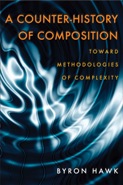A Counter-History of Composition: Toward Methodologies of Complexity
by Byron Hawk
U of Pittsburgh P, 2007, ISBN-10: 0-8229-5973-1
Reviewed by Wesley Venus, University of Georgia
| Summary | Discussion | Applicability | Pedagogy | Hopes/Desires | Conclusion(s) | Assessment | References | Notes |
Conclusion(s) |
|
 |
The most obvious critique of Hawk’s argument would almost certainly seem to be that, despite his efforts to separate vitalism from the mythical qualities of Romanticism, the argument that vitalism opens for teachers and writers a notion of rhetorical invention that is effective, but also consistent with postmodern sensibilities, still does not get any closer to an understanding of what is being written about or why. It can seem as if what Hawk refers to with rhetorical complexity and nodal networking is something like what N. Katherine Hayles is getting at in How We Became Posthuman with the notion of the black box, where she visits the contrast between behaviorism and functionalism (p. 94), which is somewhat problematic. “Whereas functionalism…foregrounds internal structure and is relatively unconcerned with the organism’s relation to the environment,” she explains there of Julian Bigelow and Arturo Rosenblueth’s definition of the two, “behaviorism focuses on relations between the organism and environment and is relatively unconcerned with internal structure.” There she argues against supposing the observation of behavior to be a suitable tool for understanding essence, and there she observes the faulty method (though not faulty conclusion) similar to what Hawk refers to once himself: that machine and mind can inform one another in meaningful ways by observing environmental interaction. One who would lay the charge of black-boxing at the feet of complex vitalism would not quite get the point. While it is true that the complex dynamics of vitalism resist rational reduction, Byron Hawk would at the very least through complex-ecology help demythify the role of the subject in its rhetorical context. |